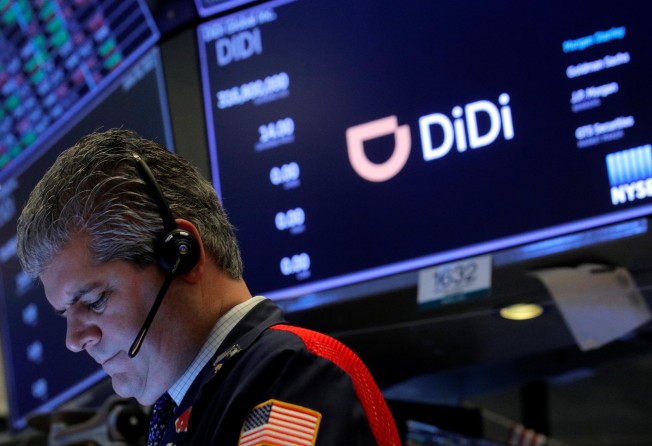
China’s new VIE rule eases concerns about overseas IPOs following months of uncertainty after Didi probe
- China’s securities watchdog published a new draft regulation stating companies can list overseas as variable interest entities if they meet compliance rules
- A requirement for security reviews of certain companies seeking overseas listings after Didi Global’s New York IPO led to uncertainty about the VIE structure

China’s securities watchdog has given tacit approval to a corporate structure that lets technology companies raise funds offshore, closing a two-decades-long regulatory loophole that has become a lightning rod in rising US-China tensions in capital markets.
Chinese companies set up as variable interest entities (VIEs) are allowed to list in offshore markets if they register with regulators and meet compliance rules, according to a draft of a new regulation released on Christmas Eve by the China Securities Regulatory Commission (CSRC). The regulation also allows mainland-incorporated firms to directly list overseas without the need for a VIE if they meet the requirements. The draft was published online to solicit public opinion through January 23.
The regulator said it would only assess the truthfulness, accuracy and completeness of submitted documents before giving applicants a green light for offshore listings, indicating that the registration-based system is not a stricter approval process.
“The draft rule ends months of speculation about China’s stance on VIEs, and it turns out to be friendly to those cash-starved tech companies and foreign funds,” said Cao Hua, a partner at private-equity firm Unity Asset Management. “At least companies that previously looked to list shares abroad via the VIE structure can stick to their fundraising plans and focus on business growth.”
A VIE structure allows founders and investment funds to set up offshore vehicles that can sign contracts with Chinese firms, giving the latter effective control of the entity.
The draft rule contradicts a December 1 report from Bloomberg that said China planned to ban initial public offerings on foreign exchanges through VIEs to address concerns about data security. It added that fundraising through VIEs would still be allowed in Hong Kong.
VIEs have been used for decades in capital markets, coming to prominence after the collapse of Enron. They are often used by Chinese companies that list on overseas stock markets, primarily the United States, to get around China’s ban on offshore investments in industries deemed to be strategically sensitive, such as the internet, fintech and telecommunications.
As of mid-September, a total of 545 mainland companies, most of which are tech start-ups, raised funds offshore through the system, according to a research report by Guotai Junan Securities.

“Now CSRC may effectively level the playing field between the US and Hong Kong with respect to this issue by itself not permitting companies that are not fully compliant with regulations in China to list overseas, full stop,” said Marcia Ellis, a partner at Morrison & Foerster and global chair of the firm’s private equity group in Hong Kong. “Some companies that are not fully compliant with all regulations in China may no longer be able to list anywhere.”
The CSRC said that the rule is not retroactive, so companies already listed as VIEs overseas are exempt from the stricter rules.
Beijing revamped its rules for overseas listings after ride-hailing behemoth Didi Global launched its US$4.4 billion IPO in New York in late June despite warnings from regulators. That triggered a data security investigation led by the powerful Cyberspace Administration of China (CAC), which recently culminated with the firm announcing plans to delist in the US in favour of Hong Kong.
Under new rules drafted by the CAC in July, Chinese companies handling the data of more than 1 million users must seek approval before listing overseas. Such reviews were later clarified to also apply to Hong Kong listings.
The new rules “don’t demand companies that seek offshore listing get regulatory approval, instead they need only file relevant documents with the CSRC for records. So it is essentially paving the way for overseas listings,” said Luo Zhiyu, a partner at DeHeng Law Offices who specialises in cross-border IPOs, mergers and acquisitions.
“But for the companies that need data security reviews or other pre-approval reviews before they can file the relevant documents, the details of such review are vague and there aren’t many precedents as it is a rather new type of regulation. This can add to uncertainty for filing with CSRC,” Luo said.
Didi’s case sparked concern about the fate of the VIE structure, which was first used by a Chinese enterprise in 2000, when Weibo owner Sina Corp listed on the Nasdaq. CSRC officials held discussions with the Securities and Futures Commission in Hong Kong, as well as investment bankers, accountants and lawyers over the past few months on the VIE structure, the South China Morning Post reported earlier this month.
Under the new rule, Beijing will strengthen oversight of companies’ operations, including the handling of data, before allowing them to list overseas.
“The filing system essentially creates a new policy tool to manage the overseas listings in terms of both quantity and quality, and the practical impact will largely depend on how CSRC will administer and adjust the implementation,” said Chen Weiheng, partner and head of China practice at US law firm Wilson Sonsini.
The lawyer added that the new rule also sheds light on a mechanism allowing for cross-border cooperation between the CSRC and overseas counterparts such as the US Securities and Exchange Commission.
Under this mechanism, the CSRC may inform an overseas regulatory counterpart of a company’s violations of China’s overseas listing rules. The overseas regulator may also request the CSRC’s assistance in regulatory investigations in connection with a Chinese company’s overseas share offering.
International underwriters of a Chinese firm’s offshore listing will also be required to register with the CSRC, according to the new regulation.
